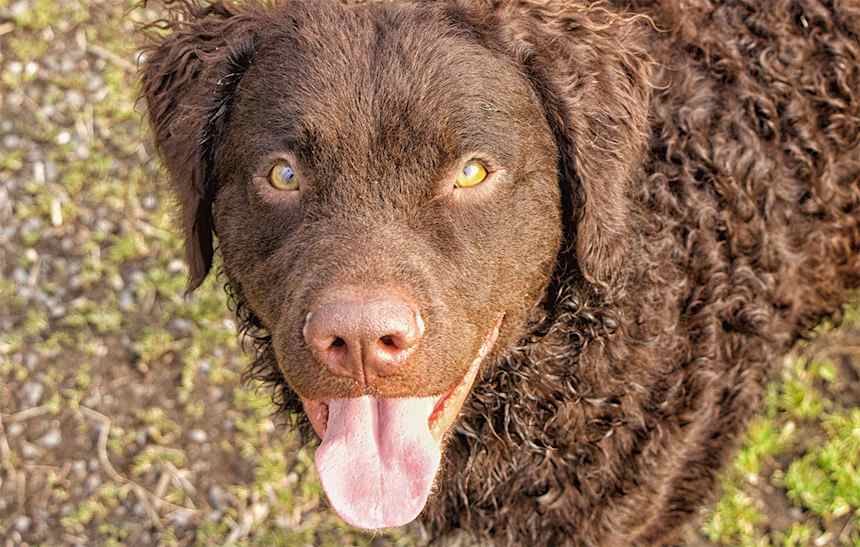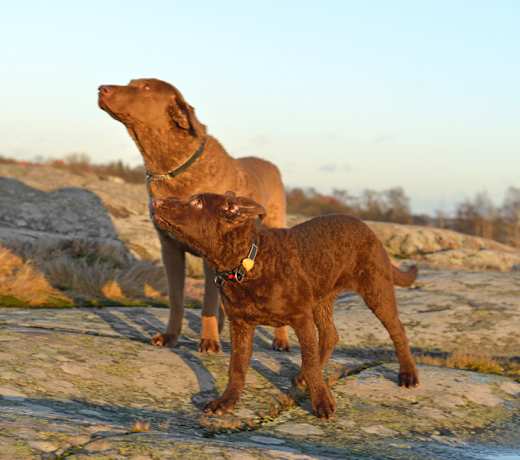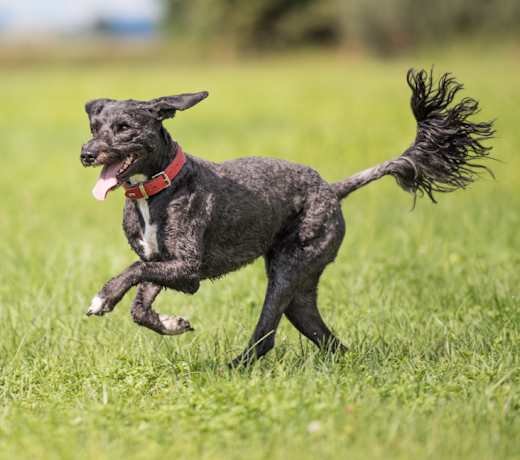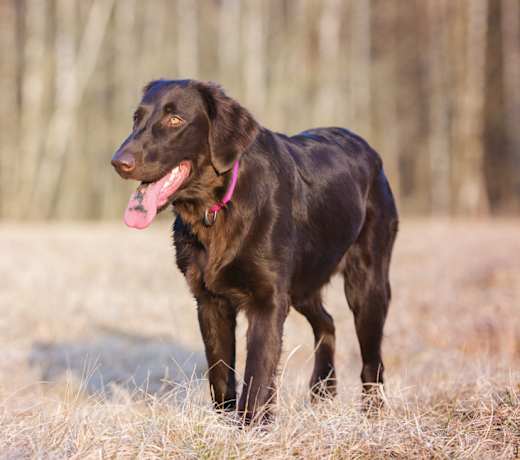Curly-Coated Retrievers are medium to large-sized dogs. Curly-Coated Retrievers are about 25 to 27 inches tall at the shoulder and typically weigh 58 to 90 pounds. Females are about 25 to 27 inches tall at the shoulder and weigh 58 to 70 pounds.
Curly-Coated Retriever
Breed Type: Sporting
Common nicknames: CCR, Curly
Coat: Curly, double
Hypoallergenic: No, they will likely trigger allergies.
Temperament: Active, friendly, smart, playful
Life expectancy: 10-12 years
Color & patterns:

The Curly-Coated Retriever is a large, athletic dog breed with — you guessed it — a unique but low-maintenance curly coat. Originally bred in England for waterfowl and game bird retrieval, the Curly-Coated Retriever stands up to 27 inches at the shoulder and possesses an uncanny knack for making fetch happen. When they wear out their high energy, you’ll find this retriever is a gentle, affable buddy with a heart as warm as a snuggly blanket. So, if you’re on the hunt for an athletic dog with a tender heart, the Curly-Coated Retriever could be the dog for you.
Curly-Coated Retriever characteristics
Learn about about Curly-Coated Retriever basics like their fur colors, shedding levels, how much grooming they need, and other Curly-Coated Retriever facts.
Average height
25-27 inches (63.5-68.6cm)
Average weight
58-90 pounds (26.3-40.8 kg)
Average lifespan
10-12 years
Exercise needs
Grooming needs
Full-grown size
Good with cats
Good with kids
Training aptitude
When do Curly-Coated Retrievers stop growing?
Curly-Coated Retrievers stop growing in height between 12 and 18 months of age. However, their bodies might continue to fill out and develop muscle mass until they are around two to three years old. This late maturation is common in larger dog breeds, as they take more time to fully develop both physically and mentally.
How long do Curly-Coated Retrievers live?
Curly-Coated Retrievers live 10 to 12 years on average. With proper care, some individuals can live slightly longer, reaching up to 13 or 14 years. Like all breeds, their lifespan is influenced by genetics, diet, exercise, and regular veterinary care.
Do Curly Coated Retrievers have webbed feet?
Yes, Curly-Coated Retrievers have webbed feet. This anatomical feature is common among breeds developed for water retrieval, as webbed feet help them swim more efficiently.
What kind of coat does a Curly-Coated Retriever have?
Curly-Coated Retrievers have a distinctive single-layered coat characterized by tight, dense curls that form a protective layer. The curls are water-resistant, helping to keep the dog from becoming waterlogged while swimming and providing insulation against cold weather. The coat is generally short to medium in length, lying close to the body. This helps reduce drag in the water when they are retrieving.
Do Curly-Coated Retrievers shed a lot?
No, Curly-Coated Retrievers do not shed a lot, especially compared to some other breeds. Although they do shed some, the shedding is minimal due to their dense, curly fur, which tends to trap loose hair rather than allow it to fall into the environment. Like many dogs, they experience more noticeable shedding during seasonal changes in spring and fall. Brushing a few times a week can help remove loose hairs.
What colors do Curly-Coated Retrievers come in?
Curly-Coated Retrievers come in two solid colors: black and liver (brown).
Curly-Coated Retriever temperament
Learn about about the Curly-Coated Retriever temperament and how well they fit into your lifestyle, home environment, and family.
Do Curly Coated Retrievers bark a lot?
No, Curly-Coated Retrievers do not bark a lot. They might bark to alert their people of a stranger approaching or something unusual in their environment. Like many dogs, they might bark when excited, if they want attention, or to play with their pet parents.
Are Curly-Coated Retrievers good family dogs?
Yes, Curly-Coated Retrievers are good family dogs. With proper training, socialization, and exercise, Curly-Coated Retrievers thrive in family environments. They are energetic dogs who require regular exercise, which can encourage an active lifestyle for the whole family. They enjoy outdoor activities like hiking, swimming, and retrieving. While they need space to run and play, they can adapt to various living situations as long as they receive sufficient exercise and mental stimulation.
Are Curly-Coated Retrievers easy to train?
Yes, Curly-Coated Retrievers are easy to train due to their intelligence and eagerness to please their pet parents. They can quickly learn commands and tasks, making training sessions effective. Using positive reinforcement techniques, such as treats and praise, works well with this breed, encouraging them to engage and learn. Like all breeds, Curly-Coated Retrievers benefit from consistent training routines and clear commands to reinforce learning.
Are Curly-Coated Retrievers cuddly?
Yes, Curly-Coated Retrievers are cuddly and affectionate with their families. They form strong bonds with their people and enjoy being close to them, including cuddling and physical contact for comfort and warmth.
Are Curly-Coated Retrievers smart?
Yes, Curly-Coated Retrievers are smart dogs who pick up commands and tasks quickly, making training sessions effective. Curly-Coated Retrievers also demonstrate good problem-solving abilities, which can be beneficial in various activities, including obedience training and agility. Originally bred as hunting and retrieving dogs, their intelligence helps them perform complex tasks in the field, such as tracking and retrieving game.
Are Curly Coated Retrievers friendly?
Yes, Curly-Coated Retrievers are friendly and outgoing. They form strong bonds with their families and enjoy being around people, showing affection through physical closeness and playful interactions. Their playful personality allows them to engage well with children and adults alike.
Are Curly-Coated Retrievers good with other dogs?
Yes, Curly-Coated Retrievers are good with other dogs, especially when properly socialized from a young age. Introducing them to a variety of dogs in different environments helps them learn appropriate behaviors. They tend to have a friendly and outgoing nature, which can make them accepting of other dogs. However, individual temperament can vary, so it's important to consider the personality of the specific dog.
Are Curly-Coated Retrievers good with kids?
Yes, Curly-Coated Retrievers are good with kids. They are playful and enjoy engaging in activities, which can make playtime fun for kids. They tend to be gentle and patient, making them good companions for children.
Like all dogs, early socialization and training are important. As with any dog, it’s essential to supervise interactions between dogs and young children to ensure safety and to teach kids how to appropriately interact with dogs. It’s also important for pet parents to teach their dogs how to gently interact with children.
Are Curly-Coated Retrievers good with cats?
Curly-Coated Retrievers can be good with cats, but it often depends on individual temperament and early socialization. Some Curly-Coated Retrievers might have a higher prey drive, making them more inclined to chase smaller animals like cats; others might be more relaxed and friendly. If a Curly-Coated Retriever is introduced to cats at a young age and has positive experiences with them, they are more likely to coexist peacefully.
Curly-Coated Retriever health
Learn about about the Curly-Coated Retriever health outlook and what diseases they may be prone to at various stages of their life.
Do Curly-Coated Retrievers have health issues?
Yes, like all breeds, Curly-Coated Retrievers are prone to certain health issues. Regular veterinary checkups, a healthy diet, proper exercise, and a good grooming routine can help minimize the risk of health problems.
What diseases are Curly-Coated Retrievers prone to?
Curly-Coated Retrievers are generally healthy, but like all dogs, they are prone to certain genetic and breed-specific diseases. Some common health conditions that Curly-Coated Retrievers are susceptible to include:
Hip dysplasia: This is a genetic condition where the hip joint does not fit properly into the hip socket, which can lead to arthritis and pain.
Eye conditions: They can develop various eye issues, such as cataracts and progressive retinal atrophy (PRA).
Gastric dilatation-volvulus (bloat): This is a serious condition that can occur in deep-chested dogs where the stomach fills with gas and potentially twists, which can be life-threatening.
Cancer: Some Curly-Coated Retrievers are susceptible to certain types of cancer.
Skin issues: Some Curly-Coated Retrievers experience skin problems, including allergies.
Ear infections: Their floppy ears can trap moisture, making them more prone to ear infections if not properly cared for.
Cancer: Like many dog breeds, Curly-Coated Retrievers can be at risk for certain types of cancer, particularly as they age.
Do you need to groom a Curly-Coated Retriever?
Yes, you need to groom a Curly-Coated Retriever, although they have a low-maintenance coat compared to other breeds. Brush their coat with a slicker brush a couple of times a week to remove loose hair. They don’t need frequent baths — about every six to eight weeks is usually sufficient, or more often if they get particularly dirty. Regularly check and clean their ears to prevent wax buildup and infections. Finally, trim their nails every few weeks and brush their teeth daily.
Do Curly-Coated Retrievers need haircuts?
No, Curly-Coated Retrievers do not need haircuts. Their curly coat is designed to be water-resistant and protect them from the elements, so maintaining the natural length is important for their overall health and functionality.
Curly-Coated Retriever history
Learn about where the Curly-Coated Retriever came from.
Where are Curly-Coated Retrievers from?
Curly-Coated Retrievers are from England, where they were developed in the late 18th century. They are one of the oldest retriever breeds, bred for hunting and retrieving game from both land and water. Their distinctive curly coat helped protect them from harsh weather and cold water during hunting expeditions.
What is the purpose of a Curly-Coated Retriever?
The primary purpose of the Curly-Coated Retriever is to retrieve game during hunting, both on land and in water. They were originally bred for bird hunting, especially for retrieving waterfowl and upland game like ducks and pheasants. Today, Curly-Coated Retrievers are also commonly seen in dog sports, obedience, and as family pets.
Are Curly-Coated Retrievers rare?
Yes, Curly-Coated Retrievers are considered relatively rare, especially compared to other retriever breeds like Labrador Retrievers or Golden Retrievers. Despite being one of the oldest retriever breeds, they have a smaller population and are less commonly seen, even among hunting households. Although their numbers remain small compared to more popular breeds, they have dedicated enthusiasts in hunting, field trials, and dog shows.
Find Curly-Coated Retriever puppies near you
Adopting a Curly-Coated Retriever
We don't see any Curly-Coated Retrievers available for adoption in your exact location or cities near you, but here are some adorable similar breeds in Beverly Hills, CA.

Retv Pup Prancer
Flat-Coated Retriever Golden Retriever
Male, 1 mo
WestLake Village, CA
Good with dogs
Good with cats
Shots are up-to-date

KENAI
Flat-Coated Retriever
Female, 10 mos
Baldwin Park, CA

Retv Pup Prancer
Flat-Coated Retriever Golden Retriever
Male, 1 mo
WestLake Village, CA
Good with dogs
Good with cats
Shots are up-to-date

KENAI
Flat-Coated Retriever
Female, 10 mos
Baldwin Park, CA



